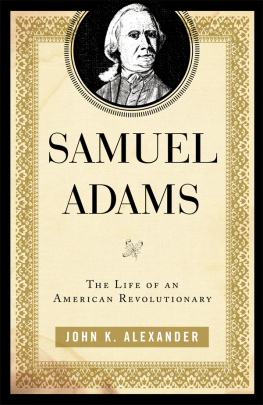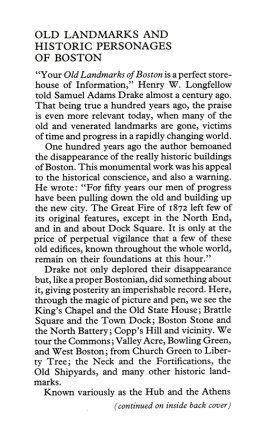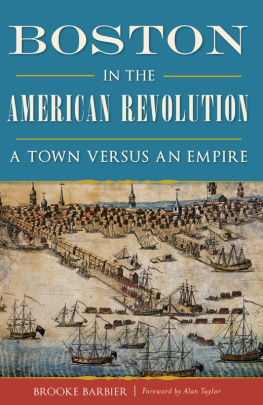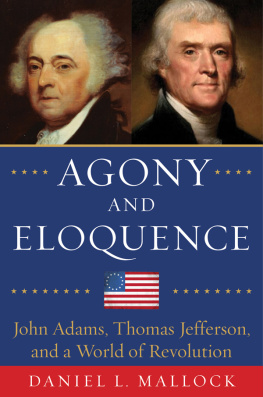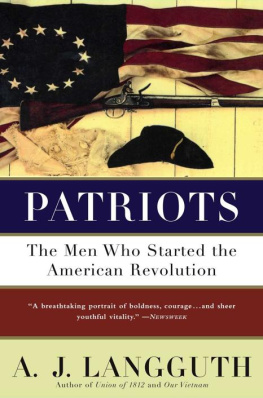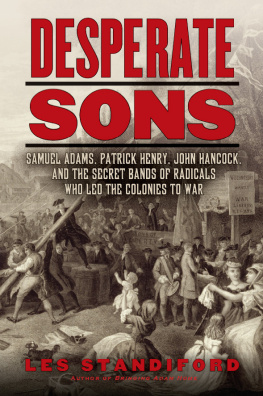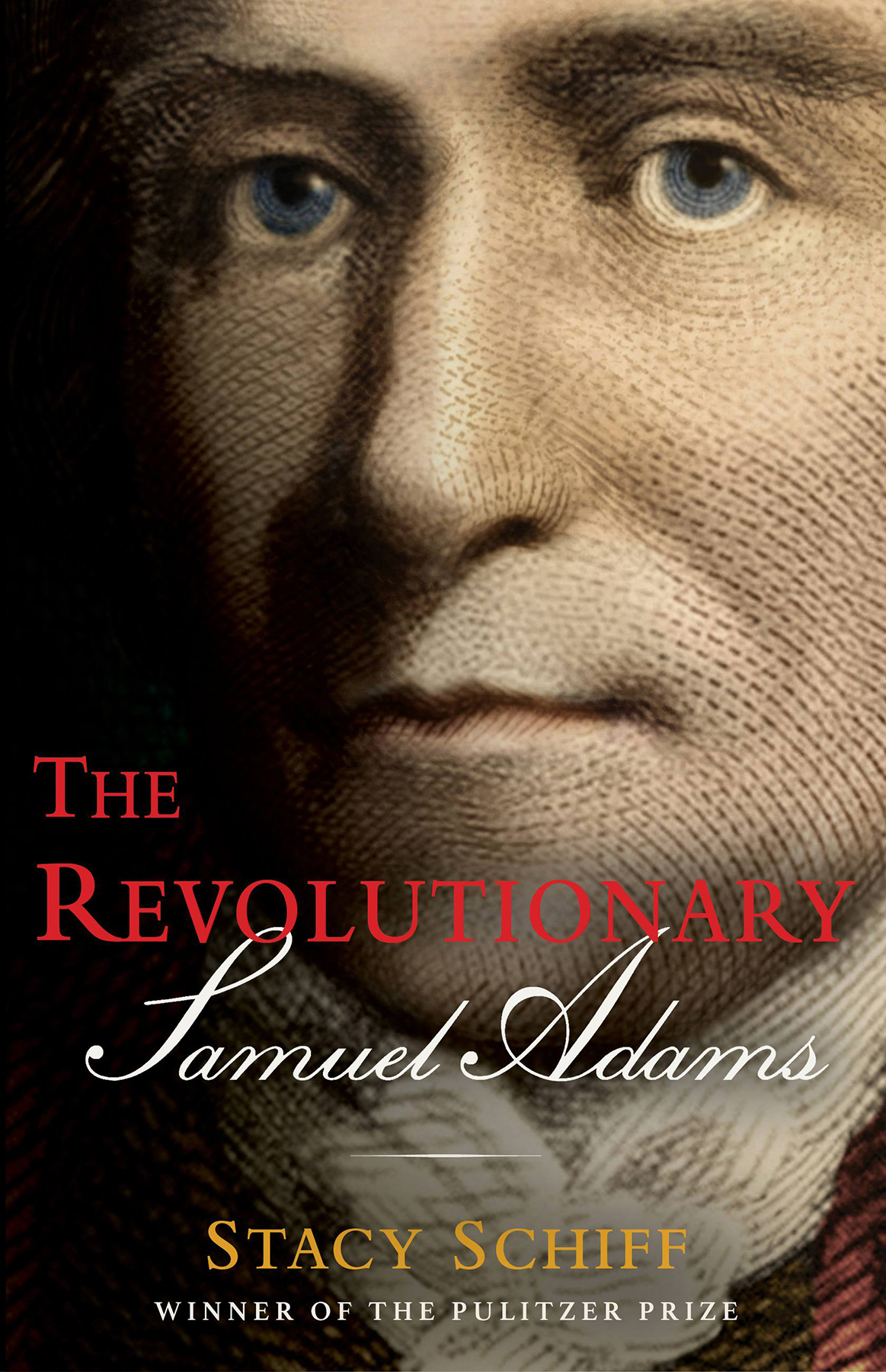Omissions are not accidents.
MARIANNE MOORE
S AMUEL A DAMS delivered what may count as the most remarkable second act in American life. It was all the more confounding after the first: he was a perfect failure until middle age. He found his footing at forty-one, when, over a dozen years, he proceeded to answer to Thomas Jeffersons description of him as truly the man of the Revolution. With singular lucidity Adams plucked ideas from the air and pinned them to the page, layering in the moral dimensions, whipping up emotions, seizing and shaping the popular imagination. On a wet 1774 night when a group of Massachusetts farmers settled in a tavern before the fire and, pipes in hand, discussed what had driven Bostonians madreasoning that Parliament might soon begin to tax horses, cows, and sheep; wondering what additional affronts could come their way; and concluding that it was better to rebel sooner rather than laterit was because the long arm of Samuel Adams had reached them. He muscled words into deeds, effecting, with various partners, a revolution that culminated, in 1776, with the Declaration of Independence. It was a sideways, looping, secretive business. Adams steered New Englanders where he was certain they meant, or should mean, to head, occasionally even revealing the destination along the way. As a grandson acknowledged: Shallow men called this cunning, and wise men wisdom. The patron saint of late bloomers, Adams proved a political genius.
His second cousin John swore that Samuel was born to sever the cord between Great Britain and America. John also believed Samuel an original; he mystified even his peers. Committed, as he termed it, to the cool voice of impartial reason, Samuel Adams breathed fire when fire-breathing was in order. Serene, sunny, tender, he seemed instinctively to grasp what righteous anger could accomplish. From four feckless decades he emerged intensely disciplined, an indomitable master of public opiniona term yet to be coined. In a colony from which, as a Crown officer observed, all the smoke, flame, and lava erupted, Adams seemed everywhere at once. If there was a subversive committee in Massachusetts, he sat on it. If there was a subversive act, he was somewhere near or behind it. He eats little, drinks little, sleeps little, thinks much, and is most decisive and indefatigable in the pursuit of his objects, noted a Philadelphia colleague, unhappily. His enemies, insisted Adams, came in handy: Our friends are either blind to our faults or not faithful enough to tell us of them. He knew that we are governed more by our feelings than by reason; with rigorous logic, he lunged at the emotions. He made a passion of decency. He was a prudent revolutionary. Among the last of his surviving words is a warning to Thomas Paine: Happy is he who is cautious.
Deeply idealistica moral people, Adams held, would elect moral leadershe believed virtue the soul of democracy. To have a villainous ruler imposed on you was a misfortune. To elect him yourself was a disgrace. At the same time he was unremittingly pragmatic. Adams saw no reason why high-minded ideals should shy from underhanded tactics. Power worried him; no one ever believed he possessed too much of the stuff. His sympathies lay with the man in the street, to whom he believed government answered. A friend distilled his politics to two maxims: Rulers should have little, the people much. And privilege should make way for genius and industry. Railing against the odious hereditary distinction of families, Adams fretted about vanity, foppery, and political idolatry. He did his best to contain himself when John Hancockwho traveled with the pomp and retinue of an Eastern princeappeared in a gold-trimmed, crimson-velvet waistcoat and an embroidered white vest. In 1794, Adams was inaugurated as governor of Massachusetts. To maintain ceremonial standards, a benefactor produced a carriage. Adams directed the coachman to drive his wife to the State House, to which he proceeded, at seventy-one, on foot.
On no count did he mystify more than in his disregard for money. I glory in being what the world calls a poor man. If my mind has ever been tinctured with envy, the rich and the great have not been its objects, he wrote his wife of sixteen years, who hardly needed a reminder. At a precarious point she supported the family. Having dissipated a fortune, having run a business into the ground, having contracted massive debts, Adams lived on air, or on what closer inspection revealed to be the charity of friends. A rarity in an industrious, hard-driving, aspirational town, he was the only member of his Harvard class to whom no profession could be ascribed. Certainly no one turned up at the Second Continental Congress as ill-dressed as Adams, who for some weeks wore the suit in which he dove into the woods near Lexington, hours before the battle. It was shabby to begin with. Alone among Americas founders, his is a riches-to-rags story.
There was an elemental purity about the man whom Crown officers believed the greatest incendiary in the kings dominion. Puritan simplicity never lost its appeal. Afflictions invigorated. Adams handily beat Ben Franklin at Franklins thirteen-point project for arriving at moral perfection. On meeting Samuel Adams in the 1770s, a foreigner marveled: It was unusual, in life or on the stage, for anyone to conform so neatly to the role he played. Here was what a republican looked like. A man wrapped up in his object, Adams disappeared into the part, from which it is difficult to pry him, identical as he was to his ideals.
In July 1774, newly arrived in London and reeling still from seasickness, the royal governor of Massachusetts was whisked off for a private interview with George III. For two hours Thomas Hutchinson briefed his sovereign on American affairs. The king seemed as eager to show off his knowledge as to learn what was happening in the most unruly of his American colonies. He asked about Indian extinction and the composition of New England bread. He had heard of Samuel Adams but had not grasped that he was the cause of so many royal headaches. Hutchinson revealed that Adams was a great man of the party. What gave him his influence? inquired the king. A great pretended zeal for liberty, and a most inflexible natural temper, explained Hutchinson, adding that Adams had been the first to advocate for American independence. Making the same point differently, Thomas Jefferson called Adams the earliest, most active, and persevering man of the Revolution. For many years it was possible to assert that he ranked with, if not above, George Washington. His fame spread alongside New England obstreperousness, which he hoped to make contagious. Very few have fortitude enough, he wrote, neatly summarizing his lifes work, to tell a tyrant they are determined to be free. Various patriots made their mark as the Samuel Adams of North Carolina, the Samuel Adams of Rhode Island, or the Samuel Adams of Georgia. The character of your Mr. Samuel Adams runs very high here. I find many who consider him the first politician in the world, reported a Bostonian from 1774 London. John Adams met with a heros welcome when he arrived in France four years later to solicit funds for the war. He hurried to clarify: He was not the renowned Mr. Adams. That was another gentleman. (No one believed him.) Without the character of Samuel Adams, declared John, the true history of the American Revolution can never be written.



